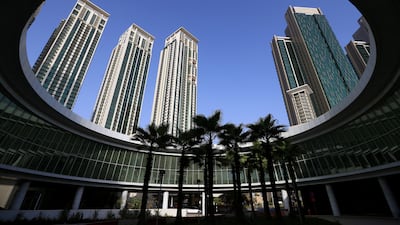Update
:
New municipal fees have come into effect - and are backdated to February
Expatriate tenants in Abu Dhabi will have to pay 3 per cent extra on their rent, as a municipality contract fee.
The new charge will be collected with monthly electricity and water bills, and will add about Dh5,000 to the cost of renting an average two-bedroom apartment. UAE nationals are exempt.
The decision to levy the new fee was published in February's Official Gazette. Officially, therefore, the charge is already in operation, but it is not known when collection will begin in practice.
The levy brings Abu Dhabi in line with Dubai, which imposes a 5 per cent municipal housing tax payable on utility bills.
"This surcharge on a rental fee coming through the water bill is the same as the Dubai housing charge, but that's 5 per cent," said Mario Volpi, head of projects at Asteco Property Management.
"Abu Dhabi is charging 3 per cent so it shouldn't be too much of a dent to tenants. It is obviously something they are going to have to factor in."
Declan McNaughton, UAE managing director of the property consultancy Chestertons, said the charge was another expense at a time when many residents were already complaining about the cost of living.
"People are now clawing on to some of their jobs. This 3 per cent will be another added pressure," he said.
"For every action, there is an equal and opposite reaction, which means if I was coming up for my tenancy renewal, I would have a good battle with my landlord to say either he takes that on board, he does a rent review or, worst case scenario, I would ask if he wanted to split it 50-50.
"Because I guarantee you very few people got a pay rise in Abu Dhabi this year, and an added 3 per cent, if you're in a Dh200,000 lease, it's another expense."
Public reaction to the new charge will be monitored closely, said Dr Abdulla Al Bloushi, head of land and property management at the muncipality..
"If there is a complaint from different people or sectors, they will take it into consideration," he said. "The job of the government is to make people happy.
"So if there is a complaint, and it is a valid complaint, then I think the government will take action. They will find a way of making things better."
Details of the new fee emerged yesterday on the opening day of the annual Abu Dhabi Cityscape exhibition, which sets the tone for property investment sentiment in the capital.
P?K Ashraf, an Abu Dhabi resident at the show to look at potential property investments, acknowledged the fee represented another expense but said it was unlikely to deter purchases.
"Things are getting difficult, starting from the parking charges and everything, but I don't know - people get used to it," he said.
The rental contract fee follows the introduction of a new levy of 4 per cent on the price of hotel stays, also announced this week.
Governments and municipal authorities across the region are seeking new sources of revenue following the rapid decline of the price of oil from above $110 a barrel in June 2014 to about $43 yesterday. Value added tax, or VAT, is expected to be introduced across the GCC by the end of 2018.
mfahy@thenational.ae
Follow The National's Business section on


